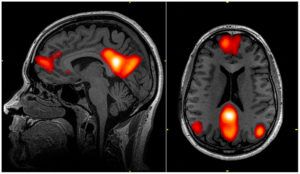Category: complex systems – Page 2


Selfish Ledger: Google’s mass sociology experiment
Check out the internal Google film, “The Selfish Ledger”. This probably wasn’t meant to slip onto a public web server, and so I have embedded a backup copy below. Ping me if it disappears. I will locate a permanent URL.
This 8½ minute video is a lot deeper—and possibly more insipid—than it appears. Nick Foster may be the Anti-Christ, or perhaps the most brilliant sociologist of modern times. It depends on your vantage point, and your belief in the potential of user controls and cat-in-bag containment.
He talks of a species propelling itself toward “desirable goals” by cataloging, data mining, and analyzing the past behavior of peers and ancestors—and then using that data to improve the experience of each user’s future and perhaps even their future generations. But, is he referring to shared goals across cultures, sexes and incomes? Who controls the algorithms and the goal filters?! Is Google the judge, arbiter and God?
Consider these quotes from the video. Do they disturb you? The last one sends a chill down my spine. But, I may be overreacting to what is simply an unexplored frontier. The next generation in AI. I cannot readily determine if it ushers in an era of good or bad:
- Behavioral sequencing « a phrase used throughout the video
- Viewing human behavior through a Lemarkian lens
- An individual is just a carrier for the gene. The gene seeks to improve itself and not its host
- And [at 7:25]: “The mass multigenerational examination of actions and results could introduce a model of behavioral sequencing.”
There’s that odd term again: behavioral sequencing. It suggests that we are mice and that Google can help us to act in unison toward society’s ideal goals.
Today, Fortune Magazine described it this way: “Total and absolute data collection could be used to shape the decisions you make … The ledger would essentially collect everything there is to know about you, your friends, your family, and everything else. It would then try to move you in one direction or another for your or society’s apparent benefit.”
The statements could apply just as easily to the NSA as it does to Google. At least we are entering into a bargain with Google. We hand them data and they had us numerous benefits (the same benefits that many users often overlook). Yet, clearly, this is heavy duty stuff—especially for the company that knows everything about everyone. Watch it a second time. Think carefully about the power that Google wields.
 Don’t get me wrong. I may be in the minority, but I generally trust Google. I recognize that I am raw material and not a client. I accept the tradeoff that I make when I use Gmail, web search, navigate to a destination or share documents. I benefit from this bargain as Google matches my behavior with improved filtering of marketing directed at me.
Don’t get me wrong. I may be in the minority, but I generally trust Google. I recognize that I am raw material and not a client. I accept the tradeoff that I make when I use Gmail, web search, navigate to a destination or share documents. I benefit from this bargain as Google matches my behavior with improved filtering of marketing directed at me.
But, in the back of my mind, I hope for the day that Google implements Blind Signaling and Response, so that my data can only be used in ways that were disclosed to me—and that strengthen and defend that bargain, without subjecting my behavior, relationships and predilections to hacking, misuse, or accidental disclosure.
Philip Raymond sits on Lifeboat’s New Money Systems board. He co-chairs CRYPSA, hosts the Bitcoin Event, publishes Wild Duck and is keynote speaker at global Cryptocurrency Conferences. Book a presentation or consulting engagement.
Credit for snagging this video: Vlad Savov @ TheVerge



What’s Love got to do with Education?
[This article is drawn from Ch. 8: “Pedagogical Love: An Evolutionary Force” in Postformal Education: A Philosophy for Complex Futures.]
“There is nothing more important in this world than radical love” as Paolo Freire told Joe Kincheloe over dinner.
- Joe Kincheloe. Reading, Writing and Cognition. 2006.
And yet, we live in a world of high-stakes testing, league tables for primary schools as well as universities, funding cuts, teacher shortages, mass shootings in schools, and rising rates of depression and suicide among young people.
The most important value missing from education today is pedagogical love.
In “Pedagogical Love: An Evolutionary Force” (Ch. 8 of Postformal Education: A Philosophy for Complex Futures) I explain why love should be at centre-stage in education. I introduce contemporary educational approaches that support a caring pedagogy, and some experiences and examples from my own and others’ practice, ending with some personal reflections on the theme.
Why do we want to educate with and for love? We live in a cynical global world with a dominant culture that does not value care and empathy. We live under the blanket of a dominant worldview that promotes values that are clearly damaging to human and environmental wellbeing. In many ways our world, with its dominance of economic values over practically all other concerns, is a world of callous values. And recently we’ve embarked on a flight from truth.
In the search for truth, the only passion that must not be discarded is love. Truth [must] become the object of increasing love and care and devotion.
- Rudolf Steiner. Metamorphoses of the Soul, Vol. I. 1909.
What a contrast Steiner’s early 20th century statement is to the lack of a love for truth that abounds in fake news in our post-Truth world. Canadian holistic educator, John Miller points to the subjugation of words like love in contemporary educational literature in the following quote:
The word ‘love’ is rarely mentioned in educational circles. The word seems out of place in a world of outcomes, accountability, and standardised tests.
- John Miller. Education and the Soul. 2000.
British educational researcher, Maggie MacLure speaks about the obsession with quantitative language in education in the UK: “objectives, outcomes, standards, high-stakes testing, competition, performance and accountability.” She argues that the resistance to the complexity and diversity of qualitative research that is found in the evidence-based agendas of the audit culture is linked to “deep-seated fears and anxieties about language and desire to control it.” In this context it is not hard to imagine that words like love might create what MacLure calls ontological panic among the educational audit-police.
In spite of these challenges several educational theorists and practitioners emphasise the importance of love—and the role of the heart—in educational settings. If young people are to thrive in educational settings, new spaces need to be opened up for softer terms, such as love, nurture, respect, reverence, awe, wonder, wellbeing, vulnerability, care, tenderness, openness, trust.
Awe, wonder, reverence, and epiphany are drawn forth not by a quest for control, domination, or certainty, but by an appreciative and open-ended engagement with the questions.
- Tobin Hart. Teaching for Wisdom. 2001.
Arthur Zajonc has developed an educational and contemplative process that he calls an “epistemology of love.” Mexican holistic education philosopher, Ramon Gallegos Nava, refers to holistic education as a “pedagogy of universal love.” Other important contributions to bringing pedagogical love into education include Nel Noddings extensive writings on “an ethics of care”, Parker Palmer’s “heart of a teacher” and Tobin Hart’s deep empathy.”
The caring teacher strives first to establish and maintain caring relations, and these relations exhibit an integrity that provides a foundation for everything teacher and student do together.
- Nel Noddings. Caring in Education. 2005.

Contrasting Human Futures: Technotopian or Human-Centred?*
[*This article was first published in the September 2017 issue of Paradigm Explorer: The Journal of the Scientific and Medical Network (Established 1973). The article was drawn from the author’s original work in her book: The Future: A Very Short Introduction (Oxford University Press, 2017), especially from Chapters 4 & 5.]
We are at a critical point today in research into human futures. Two divergent streams show up in the human futures conversations. Which direction we choose will also decide the fate of earth futures in the sense of Earth’s dual role as home for humans, and habitat for life. I choose to deliberately oversimplify here to make a vital point.
The two approaches I discuss here are informed by Oliver Markley and Willis Harman’s two contrasting future images of human development: ‘evolutionary transformational’ and ‘technological extrapolationist’ in Changing Images of Man (Markley & Harman, 1982). This has historical precedents in two types of utopian human futures distinguished by Fred Polak in The Image of the Future (Polak, 1973) and C. P. Snow’s ‘Two Cultures’ (the humanities and the sciences) (Snow, 1959).
What I call ‘human-centred futures’ is humanitarian, philosophical, and ecological. It is based on a view of humans as kind, fair, consciously evolving, peaceful agents of change with a responsibility to maintain the ecological balance between humans, Earth, and cosmos. This is an active path of conscious evolution involving ongoing psychological, socio-cultural, aesthetic, and spiritual development, and a commitment to the betterment of earthly conditions for all humanity through education, cultural diversity, greater economic and resource parity, and respect for future generations.
By contrast, what I call ‘technotopian futures’ is dehumanising, scientistic, and atomistic. It is based on a mechanistic, behaviourist model of the human being, with a thin cybernetic view of intelligence. The transhumanist ambition to create future techno-humans is anti-human and anti-evolutionary. It involves technological, biological, and genetic enhancement of humans and artificial machine ‘intelligence’. Some technotopians have transcendental dreams of abandoning Earth to build a fantasised techno-heaven on Mars or in satellite cities in outer space.
Interestingly, this contest for the control of human futures has been waged intermittently since at least the European Enlightenment. Over a fifty-year time span in the second half of the 18th century, a power struggle for human futures emerged, between human-centred values and the dehumanisation of the Industrial Revolution.
The German philosophical stream included the idealists and romantics, such as Herder, Novalis, Goethe, Hegel, and Schelling. They took their lineage from Leibniz and his 17th-century integral, spiritually-based evolutionary work. These German philosophers, along with romantic poets such as Blake, Wordsworth and Coleridge (who helped introduce German idealism to Britain) seeded a spiritual-evolutionary humanism that underpins the human-centred futures approach (Gidley, 2007).
The French philosophical influence included La Mettrie’s mechanistic man and René Descartes’s early 17th-century split between mind and body, forming the basis of French (or Cartesian) Rationalism. These French philosophers, La Mettrie and Descartes, along with the theorists of progress such as Turgot and de Condorcet, were secular humanists. Secular humanism is one lineage of technotopian futures. Scientific positivism is another (Gidley, 2017).
Transhumanism, Posthumanism and the Superman Trope
Transhumanism in the popular sense today is inextricably linked with technological enhancement or extensions of human capacities through technology. This is a technological appropriation of the original idea of transhumanism, which began as a philosophical concept grounded in the evolutionary humanism of Teilhard de Chardin, Julian Huxley, and others in the mid-20th century, as we shall see below.
In 2005, the Oxford Martin School at the University of Oxford founded The Future of Humanity Institute and appointed Swedish philosopher Nick Bostrom as its Chair. Bostrom makes a further distinction between secular humanism, concerned with human progress and improvement through education and cultural refinement, and transhumanism, involving ‘direct application of medicine and technology to overcome some of our basic biological limits.’
Bostrom’s transhumanism can enhance human performance through existing technologies, such as genetic engineering and information technologies, as well as emerging technologies, such as molecular nanotechnology and intelligence. It does not entail technological optimism, in that he regularly points to the risks of potential harm, including the ‘extreme possibility of intelligent life becoming extinct’ (Bostrom, 2014). In support of Bostrom’s concerns, renowned theoretical physicist Stephen Hawking, and billionaire entrepreneur and engineer Elon Musk have issued serious warnings about the potential existential threats to humanity that advances in ‘artificial super-intelligence’ (ASI) may release.
Not all transhumanists are in agreement, nor do they all share Bostrom’s, Hawking’s and Musk’s circumspect views. In David Pearce’s book The Hedonistic Imperative he argues for a biological programme involving genetic engineering and nanotechnology that will ‘eliminate all forms of cruelty, suffering, and malaise’ (Pearce, 1995/2015). Like the shadow side of the ‘progress narrative’ that has been used as an ideology to support racism and ethnic genocide, this sounds frighteningly like a reinvention of Comte and Spencer’s 19th century Social Darwinism. Along similar lines Byron Reese claims in his book Infinite Progress that the Internet and technology will end ‘Ignorance, Disease, Poverty, Hunger and War’ and we will colonise outer space with a billion other planets each populated with a billion people (Reese, 2013). What happens in the meantime to Earth seems of little concern to them.
One of the most extreme forms of transhumanism is posthumanism: a concept connected with the high-tech movement to create so-called machine super-intelligence. Because posthumanism requires technological intervention, posthumans are essentially a new, or hybrid, species, including the cyborg and the android. The movie character Terminator is a cyborg.
The most vocal of high-tech transhumanists have ambitions that seem to have grown out of the superman trope so dominant in early to mid-20th-century North America. Their version of transhumanism includes the idea that human functioning can be technologically enhanced exponentially, until the eventual convergence of human and machine into the singularity (another term for posthumanism). To popularise this concept Google engineer Ray Kurzweil co-founded the Singularity University in Silicon Valley in 2009. While the espoused mission of Singularity University is to use accelerating technologies to address ‘humanity’s hardest problems’, Kurzweil’s own vision is pure science fiction. In another twist, there is a striking resemblance between the Singularity University logo (below upper) and the Superman logo (below lower).
When unleashing accelerating technologies, we need to ask ourselves, how should we distinguish between authentic projects to aid humanity, and highly resourced messianic hubris? A key insight is that propositions put forward by techno-transhumanists are based on an ideology of technological determinism. This means that the development of society and its cultural values are driven by that society’s technology, not by humanity itself.
In an interesting counter-intuitive development, Bostrom points out that since the 1950s there have been periods of hype and high expectations about the prospect of AI (1950s, 1970s, 1980s, 1990s) each followed by a period of setback and disappointment that he calls an ‘AI winter’. The surge of hype and enthusiasm about the coming singularity surrounding Kurzweil’s naïve and simplistic beliefs about replicating human consciousness may be about to experience a fifth AI winter.
The Dehumanization Critique
The strongest critiques of the overextension of technology involve claims of dehumanisation, and these arguments are not new. Canadian philosopher of the electronic age Marshall McLuhan cautioned decades ago against too much human extension into technology. McLuhan famously claimed that every media extension of man is an amputation. Once we have a car, we don’t walk to the shops anymore; once we have a computer hard-drive we don’t have to remember things; and with personal GPS on our cell phones no one can find their way without it. In these instances, we are already surrendering human faculties that we have developed over millennia. It is likely that further extending human faculties through techno- and bio-enhancement will lead to arrested development in the natural evolution of higher human faculties.
From the perspective of psychology of intelligence the term artificial intelligence is an oxymoron. Intelligence, by nature, cannot be artificial and its inestimable complexity defies any notion of artificiality. We need the courage to name the notion of ‘machine intelligence’ for what it really is: anthropomorphism. Until AI researchers can define what they mean by intelligence, and explain how it relates to consciousness, the term artificial intelligence must remain a word without universal meaning. At best, so-called artificial intelligence can mean little more than machine capability, which will always be limited by the design and programming of its inventors. As for machine super-intelligence it is difficult not to read this as Silicon Valley hubris.
Furthermore, much of the transhumanist discourse of the 21st century reflects a historical and sociological naïveté. Other than Bostrom, transhumanist writers seem oblivious to the 3,000-year history of humanity’s attempts to predict, control, and understand the future (Gidley, 2017). Although many transhumanists sit squarely within a cornucopian narrative, they seem unaware of the alternating historical waves of techno-utopianism (or Cornucopianism) and techno-dystopianism (or Malthusianism). This is especially evident in their appropriation and hijacking of the term ‘transhumanism’ with little apparent knowledge or regard for its origins.
Origins of a Humanistic Transhumanism
In 1950, Pierre Teilhard de Chardin (1881–1955) published the essay From the Pre-Human to the Ultra-Human: The Phases of a Living Planet, in which he speaks of ‘some sort of Trans-Human at the ultimate heart of things’. Teilhard de Chardin’s Ultra-Human and Trans-Human were evolutionary concepts linked with spiritual/human futures. These concepts inspired his friend Sir Julian Huxley to write about transhumanism, which he did in 1957 as follows [Huxley’s italics]:
The human species can, if it wishes, transcend itself—not just sporadically, an individual here in one way, an individual there in another way—but in its entirety, as humanity. We need a name for this new belief. Perhaps transhumanism will serve: man remaining man, but transcending himself, by realising new possibilities of and for his human nature (Huxley, 1957).
Ironically, this quote is used by techno-transhumanists to attribute to Huxley the coining of the term transhumanism. And yet, their use of the term is in direct contradiction to Huxley’s use. Huxley, a biologist and humanitarian, was the first Director-General of UNESCO in 1946, and the first President of the British Humanist Association. His transhumanism was more humanistic and spiritual than technological, inspired by Teilhard de Chardin’s spiritually evolved human. These two collaborators promoted the idea of conscious evolution, which originated with the German romantic philosopher Schelling.
The evolutionary ideas that were in discussion the century before Darwin were focused on consciousness and theories of human progress as a cultural, aesthetic, and spiritual ideal. Late 18th-century German philosophers foreshadowed the 20th-century human potential and positive psychology movements. To support their evolutionary ideals for society they created a universal education system, the aim of which was to develop the whole person (Bildung in German) (Gidley, 2016).
After Darwin, two notable European philosophers began to explore the impact of Darwinian evolution on human futures, in other ways than Spencer’s social Darwinism. Friedrich Nietzsche’s ideas about the higher person (Übermensch) were informed by Darwin’s biological evolution, the German idealist writings on evolution of consciousness, and were deeply connected to his ideas on freedom.
French philosopher Henri Bergson’s contribution to the superhuman discourse first appeared in Creative Evolution (Bergson, 1907/1944). Like Nietzsche, Bergson saw the superman arising out of the human being, in much the same way that humans have arisen from animals. In parallel with the efforts of Nietzsche and Bergson, Rudolf Steiner articulated his own ideas on evolving human-centred futures, with concepts such as spirit self and spirit man (between 1904 and 1925) (Steiner, 1926/1966). During the same period Indian political activist Sri Aurobindo wrote about the Overman who was a type of consciously evolving future human being (Aurobindo, 1914/2000). Both Steiner and Sri Aurobindo founded education systems after the German bildung style of holistic human development.
Consciously Evolving Human-Centred Futures
There are three major bodies of research offering counterpoints to the techno-transhumanist claim that superhuman powers can only be reached through technological, biological, or genetic enhancement. Extensive research shows that humans have far greater capacities across many domains than we realise. In brief, these themes are the future of the body, cultural evolution and futures of thinking.
Michael Murphy’s book The Future of the Body documents ‘superhuman powers’ unrelated to technological or biological enhancement (Murphy, 1992). For forty years Murphy, founder of Esalen Institute, has been researching what he calls a Natural History of Supernormal Attributes. He has developed an archive of 10,000 studies of individual humans, throughout history, who have demonstrated supernormal experiences across twelve groups of attributes. In almost 800 pages Murphy documents the supernormal capacities of Catholic mystics, Sufi ecstatics, Hindi-Buddhist siddhis, martial arts practitioners, and elite athletes. Murphy concludes that these extreme examples are the ‘developing limbs and organs of our evolving human nature’. We also know from the examples of savants, extreme sport and adventure, and narratives of mystics and saints from the vast literature from the perennial philosophies, that we humans have always extended ourselves—often using little more than the power of our minds.
Regarding cultural evolution, numerous 20th century scholars and writers have put forward ideas about human cultural futures. Ervin László links evolution of consciousness with global planetary shifts (László, 2006). Richard Tarnas in The Passion of the Western Mind traces socio-cultural developments over the last 2,000 years, pointing to emergent changes (Tarnas, 1991). Jürgen Habermas suggests a similar developmental pattern in his book Communication and the Evolution of Society (Habermas, 1979). In the late 1990s Duane Elgin and Coleen LeDrew undertook a forty-three-nation World Values Survey, including Scandinavia, Switzerland, Britain, Canada, and the United States. They concluded, ‘a new global culture and consciousness have taken root and are beginning to grow in the world’. They called it the postmodern shift and described it as having two qualities: an ecological perspective and a self-reflexive ability (Elgin & LeDrew, 1997).
In relation to futures of thinking, adult developmental psychologists have built on positive psychology, and the human potential movement beginning with Abraham Maslow’s book Further Reaches of Human Nature (Maslow, 1971). In combination with transpersonal psychology the research is rich with extended views of human futures in cognitive, emotional, and spiritual domains. For four decades, adult developmental psychology researchers such as Michael Commons, Jan Sinnott, and Lawrence Kohlberg have been researching the systematic, pluralistic, complex, and integrated thinking of mature adults (Commons & Ross, 2008; Kohlberg, 1990; Sinnott, 1998). They call this mature thought ‘postformal reasoning’ and their research provides valuable insights into higher modes of reasoning that are central to the discourse on futures of thinking. Features they identify include complex paradoxical thinking, creativity and imagination, relativism and pluralism, self-reflection and ability to dialogue, and intuition. Ken Wilber’s integral psychology research complements his cultural history research to build a significantly enhanced image of the potential for consciously evolving human futures (Wilber, 2000).
I apply these findings to education in my book Postformal Education: A Philosophy for Complex Futures (Gidley, 2016).
Can AI ever cross the Consciousness Threshold?
Given the breadth and subtlety of postformal reasoning, how likely is it that machines could ever acquire such higher functioning human features? The technotopians discussing artificial superhuman intelligence carefully avoid the consciousness question. Bostrom explains that all the machine intelligence systems currently in use operate in a very narrow range of human cognitive capacity (weak AI). Even at its most ambitious, it is limited to trying to replicate ‘abstract reasoning and general problem-solving skills’ (strong AI). In spite of all the hype around AI and ASI, the Machine Intelligence Research Institute (MIRI)’s own website states that even ‘human-equivalent general intelligence is still largely relegated to the science fiction shelf.’ Regardless of who writes about posthumanism, and whether they are Oxford philosophers, MIT scientists, or Google engineers, they do not yet appear to be aware that there are higher forms of human reasoning than their own. Nor do they have the scientific and technological means to deliver on their high-budget fantasies. Machine super-intelligence is not only an oxymoron, but a science fiction concept.
Even if techno-developers were to succeed in replicating general intelligence (strong AI), it would only function at the level of Piaget’s formal operations. Yet adult developmental psychologists have shown that mature, high-functioning adults are capable of very complex, imaginative, integrative, paradoxical, spiritual, intuitive wisdom—just to name a few of the qualities we humans can consciously evolve. These complex postformal logics go far beyond the binary logic used in coding and programming machines, and it seems also far beyond the conceptual parameters of the AI programmers themselves. I find no evidence in the literature that anyone working with AI is aware of either the limits of formal reasoning or the vast potential of higher stages of postformal reasoning. In short, ASI proponents are entrapped in their thin cybernetic view of intelligence. As such they are oblivious to the research on evolution of consciousness, metaphysics of mind, multiple intelligences, philosophy and psychology of consciousness, transpersonal psychology and wisdom studies, all providing ample evidence that human intelligence is highly complex and evolving.
When all of this research is taken together it indicates that we humans are already capable of far greater powers of mind, emotion, body, and spirit than previously imagined. If we seriously want to develop superhuman intelligence and powers in the 21st century and beyond we have a choice. We can continue to invest heavily in naïve technotopian dreams of creating machines that can operate better than humans. Or we can invest more of our consciousness, energy, and resources on educating and consciously evolving human futures with all the wisdom that would entail.
About Professor Jennifer M. Gidley PhD
Author, psychologist, educator and futurist, Jennifer is a global thought leader and advocate for human-centred futures in an era of hi-tech hype and hubris. She is Adjunct Professor at the Institute for Sustainable Futures, UTS, Sydney and author of The Future: A Very Short Introduction (Oxford, 2017) and Postformal Education: A Philosophy for Complex Futures (Springer, 2016). As former President of the World Futures Studies Federation (2009−2017), a UNESCO and UN ECOSOC partner and global peak body for futures studies, Jennifer led a network of hundreds of the world’s leading futures scholars and researchers from over 60 countries for eight years.
References
[To check references please go to original article in Paradigm Explorer, p. 15–18]
Cancer Care in the Future
The future of cancer care should mean more cost-effective treatments, a greater focus on prevention, and a new mindset: A Surgical Oncologist’s take
Multidisciplinary team management of many types of cancer has led to significant improvements in median and overall survival. Unfortunately, there are still other cancers which we have impacted little. In patients with pancreatic adenocarcinoma and hepatocellular cancer, we have been able to improve median survival only by a matter of a few months, and at a cost of toxicity associated with the treatments. From the point of view of a surgical oncologist, I believe there will be rapid advances over the next several decades.
Robotic Surgery
There is already one surgery robot system on the market and another will soon be available. The advances in robotics and imaging have allowed for improved 3-dimensional spacial recognition of anatomy, and the range of movement of instruments will continue to improve. Real-time haptic feedback may become possible with enhanced neural network systems. It is already possible to perform some operations with greater facility, such as very low sphincter-sparing operations for rectal adenocarcinoma in patients who previously would have required a permanent colostomy. As surgeons’ ability and experience with new robotic equipment becomes greater, the number and types of operation performed will increase and patient recovery time, length of hospital stay, and return to full functional status will improve. Competition may drive down the exorbitant cost of current equipment.
More Cost Effective Screening
The mapping of the human genome was a phenomenal project and achievement. However, we still do not understand the function of all of the genes identified or the complex interactions with other molecules in the nucleus. We also forget that cancer is a perfect experiment in evolutionary biology. Once cancer has developed, we begin treatments with cytotoxic chemotherapy drugs, targeted agents, immunotherapies, and ionizing radiation. Many of the treatments are themselves mutagenic, and place selection pressure on cells with beneficial mutations allowing them to evade response or repair damage caused by the treatment, survive, multiply, and metastasize. In some patients who are seeming success stories, new cancers develop years or decades later, induced by our therapies to treat their initial cancer. Currently, we place far too little emphasis on screening and prevention of cancer. Hopefully, in the not too distant future, screening of patients with simple, readily available, and inexpensive blood tests looking at circulating cells and free DNA may allow us to recognize patients at high risk to develop certain malignancies, or to detect cancer at far earlier stages when surgical and other therapies have a higher probability of success.
Changing the Mindset
A diagnosis of cancer incites fear and uncertainty in patients and their family members. Many feel they are receiving a certain death sentence. While we have improved the probability of long-term success with some cancers, there are others where we have simply shifted the survival curve to produce a few more months of survival before the patient succumbs. We need to adopt strategies that allow us to contain and control malignant disease without necessarily eradicating it. If a tumor or tumors are in a dormant or senescent state and not causing symptoms or problems, minimally toxic treatments stopping tumor growth and progression allowing the patient to live a normal and productive life would be a success. Patients with a diagnosis of diabetes are never “cured” of their diabetes, but with proper medical management their disease can be controlled and they can survive and function without any of the negative consequences and sequelae of the disease. If we can understand genetic signaling and aberrations sufficiently, perhaps we can control cancer for long periods while maintaining a high quality of life for our patients.
Taking on Tough Political Issues
I am often asked by patients if I believe there will ever be a “cure” for cancer. I invariably reply it is unlikely if we continue to engage in activities and behaviors which increase the likelihood of developing cancer. Cigarette smoking, smokeless tobacco use, excess alcohol or food intake, lack of exercise, and pollution of the environment around us produce carcinogens or conditions increasing the risk of cancer development. Unless we find the courage and strength to limit access or ban substances that are known carcinogens, like cigarettes, and begin as thoughtful citizens of the planet behaving in a more responsible fashion to eliminate air, ground, and water pollution, we will not make a significant impact on the incidence of cancer. We must also be willing to develop greater and more far reaching population education programs about things as simple as proper ultraviolet light protection during sun exposure, and to recognize tanning beds or excessive, unprotected natural sunlight exposure increases the risk of a particularly difficult and vicious malignancy, melanoma. Whether we like to admit it or not, humans respond to societal pressures and images displayed or touted by media, marketing firms, or so-called beauty and glamor outlets that may actually be harmful to the health of the populace. People do and should have a free will, but they should also be given understandable, honest, and rational information on the potential consequences of their choices. There should also be a higher level of personal accountability and responsibility for negative outcomes based on an individual’s choices.
Global Cancer Care
It is estimated that between half and two thirds of the world’s population, particularly in poor or developing countries, have limited or no access to cancer prevention, screening, or care. The improved outcomes we report in medical and surgical journals from advanced countries assume the treatment can be paid for and access is available to all. Nothing is further from the truth. Meaningful efforts to rein in the rampant increases in cancer drug costs, reduce the prohibitively long and expensive process to develop and approve a novel treatment, and to provide training and education for practitioners in developing countries must be made. The disparities even within the United States are great, and it is well known and documented that disadvantage populations are often diagnosed with later stage disease, and generally have reduced chances of long-term success with the treatments available. We must become inclusive, not exclusive, in our worldview and through outreach and development programs begin to build infrastructure and access to affordable care worldwide.
Thinking Outside the Box
Personalized or individualized patient cancer care is a popular buzz phrase these days. In reality, we currently have very few drugs or targeted agents to act upon the numerous genetic or epigenetic abnormalities present in the average cancer. To search for drugs to new targets or abnormal pathways, we must create a system where there is rapid assessment, cost effectiveness, and streamlined regulatory approval for patients with lethal diseases. Personalized cancer treatment is not affordable without major changes in policy and practice. We should recognize malignant tumors have interesting physicochemical and electrical properties different from the normal tissues from which they arise. Therapy with electromagnetic fields specifically tailored to a given patient’s tumor properties can enhance tumor blood flow and improve delivery of drugs or agents while reducing toxicity and side effects. Developing approaches that do not produce acute and long-term side effects or an increased risk to develop second malignancies must be a priority.
Science and technology information is being produced at an incomprehensible rate. We need help from specialized colleagues with big data management and recognition of trends and developments which can be quickly disseminated throughout the medical community, and to appropriate patient populations. All of these measures require commitment and dedication to changing the way we think, reversing priorities based far too much on profitability of treatments rather than availability and affordability of treatment, and we cannot ignore the importance of programs to improve cancer prevention, screening, and early diagnosis.



